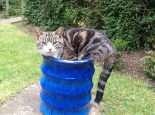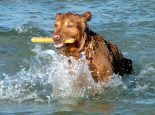Welcome, new furry friend

Welcoming a new furry family member is wonderfully exciting, but it can also be quite daunting – especially if you are a first-time pet owner. As we head into spring and approach the peak time for breeding, Best Friends Veterinary Group offers some top tips on caring for your new puppy or kitten and helping it through the first few months of life
Play and discipline
Stalking and pouncing are important play behaviour and encourage muscle development. By providing toys, your pet will be less likely to use family members for these activities – the best toys are interactive, stimulating and appropriately sized. Disciplining may be necessary if behaviour threatens people or property, but harsh punishment should be avoided. Remote punishment is preferred because then the pet associates punishment with the undesirable act itself, not with you, and consists of using something that appears unconnected to the punisher. Use spray bottles, throw objects in the direction of the puppy or kitten to startle (but not hit) it, or make loud noises.
Socialisation
Puppies are very impressionable, especially between 4-12 weeks old. Good experiences in this time will stay with them throughout their life, so exposure to as many types of social events and influences as possible is advisable. Unfortunately until your pet has completed its vaccination course they will not have built up immunity against common diseases, therefore any socialisation carries risks that should be considered.
Food
Diet is extremely important in the growing months of a pet’s life and beyond. Dry food is definitely less expensive than wet, especially given that wet contains around 75% water, compared to only 10% in dried food. Wet food is often more appealing to a dog’s taste, however will not be any more nutritious or as good for maintaining a healthy mouth and teeth as dry. A good quality dry food will also have less undigested particles and therefore create less physical waste (faeces). By feeding any pet very tasty food you run the risk of creating a very finicky appetite, they will often start to hold out for table scraps and not eat their wellbalanced dog food. Whilst we enjoy a variety of things to eat in our diet, dogs prefer not to change from one food to another unless they are trained to do so by the way you feed them. Do not feel guilty if your cat or dog is happy to eat just one food day after day, week after week. We recommend Royal Canin pet food as it is a complete food and does not need supplementing. Our staff will be happy to advise you on the most suitable food for your puppy or kitten.
Vaccinations
Puppies and kittens should both ideally have a full course of vaccinations between 6-12 weeks, which is two injections several weeks apart. After this they will require a booster every 12 months for the rest of their life to keep their immunity up.
Fleas and worms
Ideally you should treat your pet with a preventative flea treatment every month throughout the year. The choices available are vast, many are not suitable for use on puppies and kittens, different types vary in cover (just killing fleas, stopping their lifecycle etc…) as well as their protection against other parasites such a lungworm. We would be happy to advise you on this to ensure you make an appropriate choice for the size and lifestyle of your puppy or kitten. Worming should be done more frequently during the first few months and at a weight-appropriate dose for their growing size. Below is a standard guide, however house cats and hunting pets may need a different approach for their adult lifestyle, ask your vet for more details.
● Puppies: every two weeks from 2-12 weeks old, then every three months
● Kittens: every two weeks from 6-12 weeks old, then every three months
Microchipping
Microchips are the best way of identifying and contacting the rightful owner of a pet should it get lost or be stolen. The microchips we use are the size of a grain of rice and are not made from glass, making them shatterproof so they will last a lifetime. They are inserted in the scruff of the neck by injection and no anaesthetic is required. It became law in April 2016 for all dogs to be microchipped. Please ensure you keep the information registered to this chip regularly.
Neutering
Once your puppy or kitten is six months old, you should consider getting him or her neutered for preventative healthcare reasons. Both operations are done under general anaesthetic and require a day’s stay at the vets, however they are normally allowed home that evening and are fully recovered from the operation within about two weeks.
Broadway Veterinary Hospital 158 Broadway, Peterborough E: T: 01733 562904
Image: www.freepik.com/free-photo/cat-lying_945433















